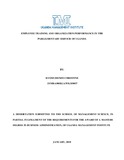Employee Training and Organisation Performance in the Parliamentary Service of Uganda.
Abstract
The study examined the relationship between employee training and organization
performance in the Parliamentary Service of Uganda. The objectives were; to establish the
relationship between training regulations and organization performance, to examine the
relationship between types of training and organization performance, and to determine the
relationship between training resources and organization performance in the Parliamentary
Service of Uganda. The study adopted a correlation research design where quantitative and
qualitative approaches were used. A total of 253 questionnaires were distributed to
respondents and 216 fully filled and returned; 14 interviews were conducted, and the
overall response rate was 85%. Simple random and purposive samplings were used as
sampling techniques. Analysis was done using both descriptive, and inferential statistics of
Spearman’ correlation coefficient (rho). Qualitative data was examined and categorized
into themes, while quantitative data was coded and entered into SPSS package. Findings
were done per objective; objective 1 showed a correlation coefficient of 0.538, objective 2
revealed a correlation coefficient of 0.549, and objective 3 showed a coefficient of 0.595.
All findings in the three objectives indicated a moderate positive significant relationship
between organization performance and the training concepts of regulations, types and
resources. The researcher therefore concluded that training regulations, types of training,
and training resources all have a relationship with organizational performance in the
Parliamentary Service of Uganda. Basing on the findings, the study recommended that the
Parliamentary Service should conduct training needs assessments before recommending
trainings for its employees, front a transparent training policy which provides for equal
opportunities in training, promote off-the-job training as staff consider it more motivating,
and further uphold its investment on training and development. It should also conduct
training evaluations to determine the effectiveness of the trainings obtained by staff, and
provide adequate guidance to staff so as to perform much better.

